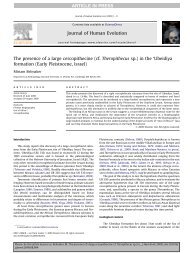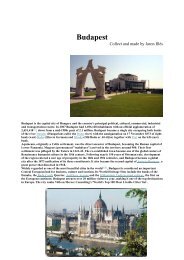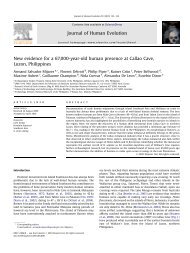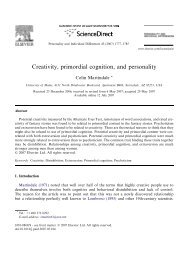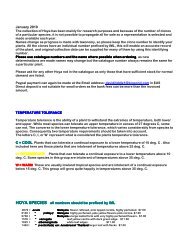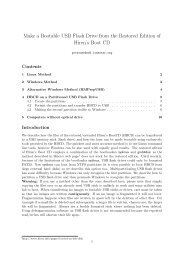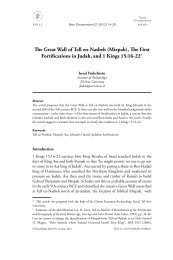David in the Service of King Achish of Gath: Renegade to His ...
David in the Service of King Achish of Gath: Renegade to His ...
David in the Service of King Achish of Gath: Renegade to His ...
Create successful ePaper yourself
Turn your PDF publications into a flip-book with our unique Google optimized e-Paper software.
76 Y. Shemesh / Vetus Testamentum 57 (2007) 73-90<br />
Philist<strong>in</strong>es) evil for good. Th at would have been a conspiracy and most<br />
unseemly”. In practice Abravanel is try<strong>in</strong>g <strong>to</strong> have it both ways, and <strong>to</strong> depict<br />
<strong>David</strong> as loyal <strong>to</strong> both Saul and <strong>Achish</strong>. Th e only way he can manage this is<br />
by <strong>of</strong>fer<strong>in</strong>g an extremely forced <strong>in</strong>terpretation:<br />
When he went [<strong>to</strong> jo<strong>in</strong> him] <strong>David</strong> thought that he would serve as <strong>Achish</strong>’s<br />
bodyguard and stay near him, but would not fight aga<strong>in</strong>st Israel and not raise his<br />
hand aga<strong>in</strong>st K<strong>in</strong>g Saul; [<strong>in</strong> this way] he would nei<strong>the</strong>r be a help nor a h<strong>in</strong>drance<br />
<strong>to</strong> <strong>the</strong> Philist<strong>in</strong>es. 5<br />
Abravanel does not expla<strong>in</strong> how <strong>David</strong> could have served as <strong>Achish</strong>’s bodyguard<br />
without tak<strong>in</strong>g an active part <strong>in</strong> <strong>the</strong> battle and what role <strong>David</strong> <strong>in</strong>tended<br />
his brigade <strong>of</strong> Hebrews <strong>to</strong> play <strong>in</strong> <strong>the</strong> battle. Similarly, <strong>in</strong> his commentary on<br />
1 Sam. xxvii 8, 10, Abravanel argues that <strong>David</strong>’s raids on <strong>the</strong> Geshurites,<br />
Gizrites, and Amalekites were no betrayal <strong>of</strong> <strong>the</strong> Philist<strong>in</strong>es and <strong>Achish</strong>, but<br />
<strong>in</strong> <strong>the</strong>ir <strong>in</strong>terest, because those tribes pillaged <strong>the</strong> Philist<strong>in</strong>es, <strong>to</strong>o (as stated<br />
explicitly, with regard <strong>to</strong> <strong>the</strong> Amalekites, <strong>in</strong> xxx 16). 6 My feel<strong>in</strong>g is that Abravanel<br />
was <strong>in</strong>fluenced by his own biography: aft er serv<strong>in</strong>g as treasurer <strong>to</strong> K<strong>in</strong>g<br />
Alfonso V <strong>of</strong> Portugal, he was suspected <strong>of</strong> participat<strong>in</strong>g <strong>in</strong> a conspiracy<br />
aga<strong>in</strong>st his successor, João II, and forced <strong>to</strong> flee <strong>to</strong> Spa<strong>in</strong> <strong>in</strong> 1483. It was at this<br />
juncture <strong>in</strong> his life that he wrote his commentary on <strong>the</strong> books <strong>of</strong> Joshua,<br />
Judges, and Samuel. With this immediate background, it is easy <strong>to</strong> understand<br />
that he would deem it important <strong>to</strong> emphasize <strong>the</strong> loyalty <strong>of</strong> Hebrews/<br />
Jews <strong>to</strong> <strong>the</strong> foreign rulers <strong>the</strong>y served. 7<br />
Few modern scholars share <strong>the</strong> confidence <strong>of</strong> Gersonides (and <strong>the</strong> Philist<strong>in</strong>e<br />
commanders) that <strong>David</strong> <strong>in</strong>tended <strong>to</strong> serve as a fift h column and fight<br />
5) Don Isaac Abravanel, Commentary on <strong>the</strong> Former Prophets (Jerusalem, [1955]), p. 301<br />
(Hebrew).<br />
6) Ibid., p. 292.<br />
7) Th e same approach, though more moderate than <strong>in</strong> Abravanel, is taken by Josephus Flavius,<br />
ano<strong>the</strong>r Jew who had <strong>to</strong> prove his loyalty <strong>to</strong> a foreign power. Josephus does not dispel <strong>the</strong><br />
vagueness concern<strong>in</strong>g <strong>David</strong>’s true <strong>in</strong>tentions, but supplements <strong>the</strong> Masoretic text with <strong>Achish</strong>’s<br />
reply <strong>to</strong> <strong>David</strong> that he will be <strong>of</strong> great help even if he rema<strong>in</strong>s <strong>in</strong> <strong>the</strong> rear echelon: “Th ere<br />
keep guard for me over <strong>the</strong> country, lest any <strong>of</strong> <strong>the</strong> enemy <strong>in</strong>vade it. Th at <strong>to</strong>o is <strong>the</strong> part <strong>of</strong> an<br />
ally” (Antiquities <strong>of</strong> <strong>the</strong> Jews VI, 14,5) (tr. Th ackeray and Marcus). Begg notes that <strong>the</strong> “ally<br />
term<strong>in</strong>ology” <strong>in</strong> Josephus’ account <strong>of</strong> <strong>David</strong>’s relations with <strong>the</strong> Philist<strong>in</strong>es is meant <strong>to</strong> show<br />
his Roman readers that “Jews are <strong>in</strong>deed capable <strong>of</strong> be<strong>in</strong>g reliable ‘allies’ <strong>of</strong> a foreign overlord”.<br />
See C. Begg, “<strong>David</strong>’s Dismissal by <strong>the</strong> Philist<strong>in</strong>es accord<strong>in</strong>g <strong>to</strong> Josephus”, Theologische<br />
Zeitschrift 54 (1998), pp. 111-119 (on 118).




